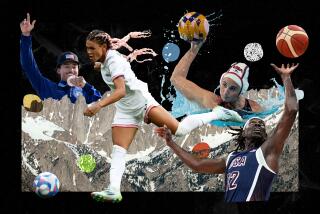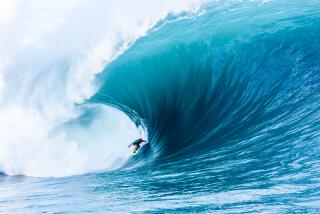They’re Outracing World in Outriggers : Canoeing: Southern California teams are quickly catching up to the Hawaiians and Tahitians in this ancient sport.
SAN DIEGO — The day when outrigger canoe racing becomes an Olympic sport might not be far off. Should that happen, the United States can almost count on a bushel full of medals.
Why wouldn’t Americans dominate the Olympics’ first outrigger paddling event? After all, the sport was invented in Hawaii. But by 1996 or 2000, the best paddlers in the world could be from Southern California.
It sounds almost disrespectful, boats full of fair-haired mainlanders out-paddling the Pacific Rim for the gold. But such a thing has already happened in the Hawaiian Islands and off the coast of Tahiti, current home of the world’s best racers.
In today’s La Jolla to Del Mar Ironman Championships, which start at 8:45 a.m. at La Jolla Shores, the entry list will include the current men’s and women’s world champions and record-holders in the Molokai to Oahu Challenge, this sport’s Kentucky Derby.
The teams come from the Off Shore Canoeing Club. Address? Newport Beach, Calif.
“The best long-distance paddlers in the world are in California, and we’re closing the gap in the sprints,” said Dee Van Winkle, coach and founder of the San Diego Outrigger Canoe Club. “And our women are just dominating.”
Said Gary Stephany, president of the San Diego-based Kai Elua Outrigger Canoe Club, host of the Ironman event: “The Californians have caught up, but we still don’t have the depth and financial backing of the Tahitians and Hawaiians. If we got the funding like other sports in this country, there’s no question we’d be better.”
San Diego’s three clubs--the third is Hano Hano Outrigger Canoeing Club--have played no small part in this surprising success.
Today’s event is the final race of the long-course season and will determine the 1990 state champions in six different categories, including men, women, masters and novices. Approximately 20 clubs are expected to compete. The Kalifornia Outrigger Assn., which sanctions the event, expects as many as 40 of these ancient six-man war canoes with pontoon-like “outrig” balance beams in the water for each race.
San Diego Outrigger’s men have won the open division of this race--a 15-miler that runs to Del Mar and back--three of the past four years.
Of course, San Diego Outrigger, like many California teams, approaches this sport as seriously as ancient Hawaiian men who, legend has it, sometimes wagered their wives on a race. Most of this four-year-old club’s members don’t just paddle but also run, swim, ride a bike, lift weights and watch their diets.
“There aren’t any recreational paddlers on our club,” Van Winkle said. “We only race to win, and winning’s fun.”
In 1988, San Diego Outrigger’s men and women swept the Ironman open competition and later swept the California sprint championships masters division. The club topped off the year with two championships and three second-place finishes at the International Polynesian Canoe Federation World Championships in Hawaii.
Van Winkle, 47, is sort of an outrigging guru in San Diego. He was a founding member of Kai Elua in 1979. He and fellow Kai Elua founder Egan Horcajo helped form Hano Hano in 1981 and build it into California’s winningest club.
Kai Elua has been slowed recently by a coaching change, and Hano Hano has taken a step back to reorganize. Both clubs are intent upon preserving a Polynesian spirit of paddling more for the pleasure than a prize.
“We’re having fun again,” said Horcajo, the Hano Hano coach and president who began paddling as a teen-ager in Molokai. “Winning’s fun, but we lost the camaraderie. We were all at each other’s throats.”
But when Van Winkle formed San Diego Outrigger, those with a burning desire to win followed.
“It’s a very serious sport,” he said. “There have been divorces and marriages gone on the rocks because of it.”
This all started in 1959--some 73 years after official racing on the Pacific Rim was first documented--when a handful of native Hawaiians decided to introduce the sport on the mainland. Among them, according to Stephany, was Sandy Kahanamoku, a nephew of Duke Kahanamoku, a three-time U.S. Olympic swimming gold medalist who helped introduce surfing to the West Coast in the 1920s.
But the pace really picked up in the 1980s, when California clubs switched from the traditional koawood canoes to fiberglass shells and started experimenting with new stroke techniques.
“Some of them are combining the Hawaiian stroke with a stroke used by the U.S. Olympic canoe team, and it’s putting them right there with the Tahitians and Hawaiians,” said Kai Elua paddler Tama Sotoa, a native of American Samoa, where outriggers are about as common as television sets are in the United States. “They’re not leaning over the boat and pulling the paddle as much, and the boat doesn’t rock as much. It’s a smoother (and more efficient) ride.”
There is still a question whether a future Olympic organizing committee will take the first step and include outrigger canoeing as a demonstration sport in its program. Stephany said the Los Angeles Olympic Organizing Committee took a hard look when the IPCF staged its first world sprint championships in Long Beach during the 1984 Games. Stephany and one of his Kai Elua teams earned two silver medals.
Stephany said he had been told before the 1984 Games that 20 countries had to be participating in a sport for it to be considered for an Olympic exhibition. He said there are about 15 countries competing in outrigger canoeing now.
Horcajo, whose Hano Hano team finished third behind two Tahitian teams in 1986 world sprint championships, is waiting for the day the sport has an Olympic venue.
“Tahiti puts its (best paddlers) together like Olympic teams,” he said. “If we selected people that way, we’d blow their doors off.”
Notes
Because the racing will take place approximately a mile and a half off the coast, spectators can only view the races from certain observation points. Suggested sites are the Torrey Pines cliffs area, with its hang glider port and a viewpoint above Scripps Institute of Oceanography, and vistas along the Pacific Coast Highway stretch between La Jolla and Del Mar. . . . Women’s open and masters teams will start the racing at 8:45 a.m. Men’s open and masters will race at 11:45 a.m., and novice men and women will compete at 2 p.m. . . . Races last approximately two hours. . . . The racing will be followed by a Polynesian festival at La Jolla Shores at 4 p.m.
More to Read
Go beyond the scoreboard
Get the latest on L.A.'s teams in the daily Sports Report newsletter.
You may occasionally receive promotional content from the Los Angeles Times.






